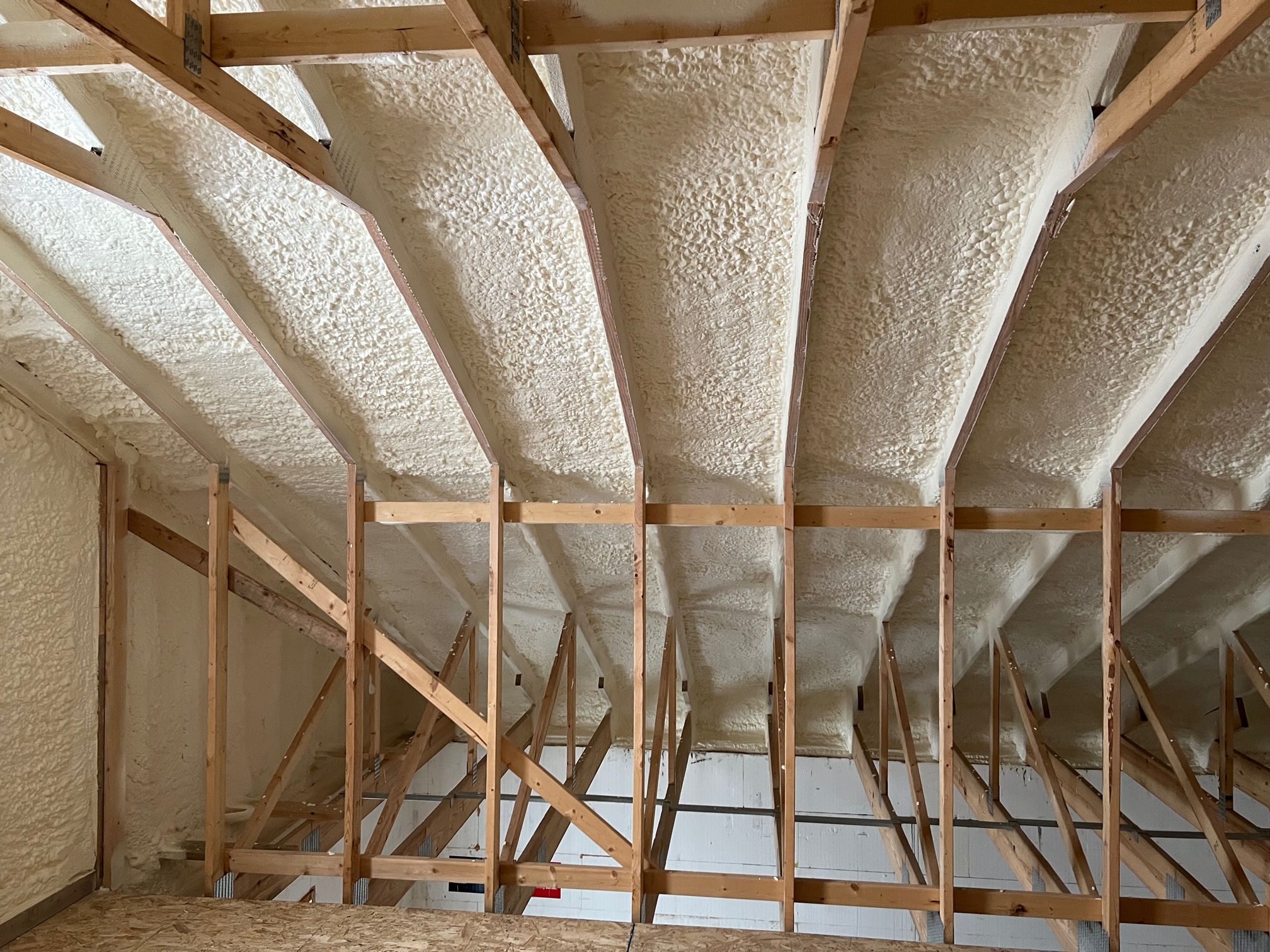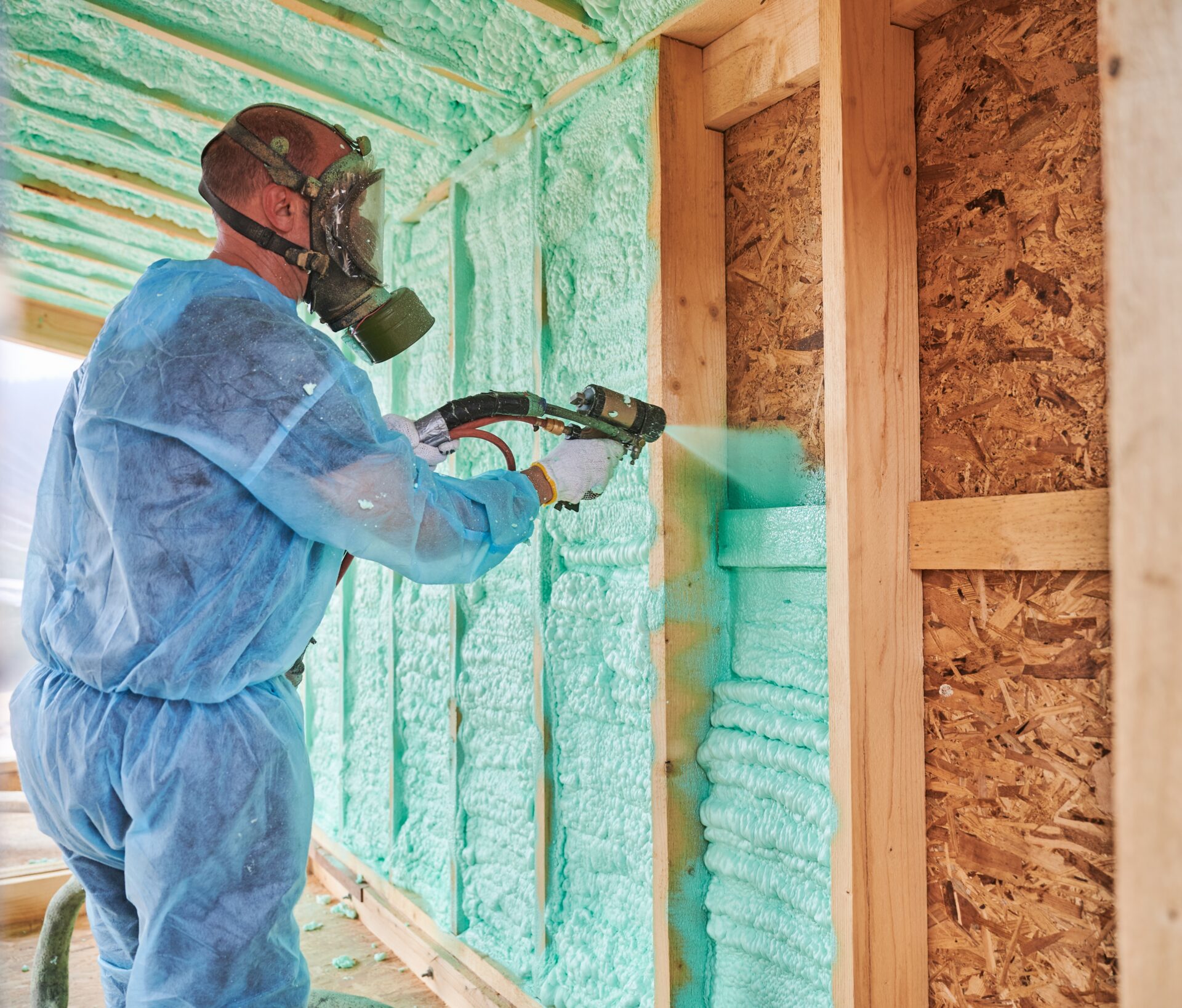How Spray Foam Can Boost Power Effectiveness in Your Home
How Spray Foam Can Boost Power Effectiveness in Your Home
Blog Article
Spray Foam: The Ultimate Service for Air Sealing and Insulation
Spray foam insulation has arised as a leading solution for efficient air sealing and thermal insulation, offering a special mix of buildings that establish it in addition to traditional methods. Its capacity to expand and fill voids makes it particularly reliable in protecting against air leak, which can significantly impact power performance. Understanding the complete range of its benefits, installation procedures, and contrasts with other insulation types is crucial for making educated decisions. As we explore these aspects, the ramifications for both new buildings and retrofits become significantly considerable. What elements should affect your option?
What Is Spray Foam?
Spray foam is a versatile insulation product that combines the principles of air securing and thermal resistance to enhance energy performance in buildings. Made up primarily of polyurethane or various other similar compounds, spray foam is used as a fluid that broadens upon call with surface areas, developing a solid, constant layer of insulation. This one-of-a-kind property enables it to fill up gaps, fractures, and gaps that traditional insulation materials might forget, providing a remarkable air seal.
There are two primary kinds of spray foam: open-cell and closed-cell. Open-cell spray foam is lighter and more adaptable, providing superb audio absorption and a lower R-value per inch - Spray Foam. In contrast, closed-cell spray foam is denser, providing a greater R-value, moisture resistance, and added architectural stability to developing components
The application process typically includes customized tools, guaranteeing a smooth application that sticks to different substratums, consisting of steel, wood, and concrete. This flexibility makes spray foam suitable for both brand-new buildings and retrofitting existing structures. Its capability to create an impermeable barrier significantly contributes to reducing energy intake and improving interior air high quality, therefore making it a favored option amongst home owners and builders alike.
Advantages of Spray Foam Insulation
One of one of the most substantial benefits of spray foam insulation is its exceptional capacity to produce a continual air obstacle, which successfully reduces power loss. Unlike standard insulation materials, spray foam increases to fill up spaces and splits, making certain that air leakage is significantly reduced. This particular not only improves power effectiveness yet likewise causes lower energy bills with time.
Additionally, spray foam insulation gives remarkable thermal resistance, adding to an extra stable interior environment. Its high R-value per inch permits effective insulation in constrained areas, making it ideal for attics, walls, and crawl rooms. Additionally, the moisture-resistant residential properties of spray foam assistance avoid mold and mildew and mold growth, advertising much healthier living conditions.
Another critical benefit of spray foam insulation is its sound-dampening top qualities (Spray Foam). It properly reduces noise transmission between spaces, developing a quieter and extra comfy home setting. The sturdiness of spray foam additionally attracts attention, as it does not droop or work out in time, preserving its performance throughout its life expectancy
Exactly How Spray Foam Works
Comprehending exactly how spray foam insulation functions is necessary for valuing its efficiency in air securing and thermal resistance. Spray foam insulation contains 2 main elements: isocyanate and polyol resin. When these components are combined, they undertake a chain reaction that creates the product to broaden quickly, producing a dense foam that fills voids, splits, and tooth cavities.
As the foam broadens, it sticks to surface areas, creating a closed seal that considerably lowers air infiltration. This characteristic makes spray foam insulation highly efficient at preventing drafts and wetness penetration, which can bring about energy loss and damages gradually. Additionally, the closed-cell version of spray foam provides superior thermal resistance as a result of its stiff structure, properly lessening heat transfer.
The special buildings of spray foam enable it to adapt uneven surfaces, making sure comprehensive protection and a smooth barrier. As a result, spray foam insulation not just enhances energy performance but likewise adds to improved interior air top quality by lowering the accumulation of pollutants and allergens. Eventually, comprehending the mechanics behind spray foam highlights its duty as a superior option for insulation and air securing in both household and commercial applications.
Setup Process Overview

Prior to installment, the room must be sufficiently cleansed and prepped, making certain that surfaces are totally free from particles, dust, and wetness. Because contaminants can endanger attachment and total efficiency, this action is critical. As soon as the area is prepared, the application involves mixing both components of the spray foam, which increases upon get in touch with and fills up voids efficiently.
Educated specialists should perform the installment, making use of specific devices to make certain consistent coverage and optimal density. Safety and security preventative measures, including wearing safety gear and ensuring correct ventilation, are necessary original site during this procedure. After application, the foam commonly treatments rapidly, forming a strong barrier that boosts energy efficiency.
Contrasting Spray Foam to Traditional Insulation
When reviewing insulation choices, spray foam insulation stands out in contrast to conventional products such as fiberglass and cellulose. One of the main advantages of spray foam is its remarkable air securing abilities. Unlike fiberglass and cellulose, which can enable air seepage, spray foam expands upon application, loading gaps and gaps to develop a closed seal. This results in improved power efficiency, as less warmed or cooled down air leaves the home, leading to lower energy costs.
Furthermore, spray foam supplies a greater R-value per inch than traditional insulation types, providing more efficient thermal resistance in a thinner profile. This characteristic is especially valuable in spaces with limited cavity depth. Moreover, spray foam is immune to moisture and mold development, which can be a significant worry about cellulose and fiberglass, especially in damp atmospheres.
Nonetheless, spray foam insulation normally brings a higher upfront cost than its traditional counterparts. Homeowners have to weigh this initial financial investment versus lasting power savings and efficiency benefits. Inevitably, while both insulation types serve their objective, spray foam emerges as an extra innovative service for modern insulation demands, specifically in terms of air securing and thermal effectiveness.

Final Thought
In recap, spray foam insulation stands for a highly reliable service for accomplishing optimum get redirected here air securing and thermal resistance. Its distinct residential or commercial properties, including wetness resistance and noise dampening, make it appropriate for numerous applications in both brand-new building and constructions and retrofitting projects (Spray Foam). The initial prices may be higher contrasted to typical insulation products, the lasting advantages, such as considerable energy savings and improved indoor air top quality, warrant the financial investment and emphasize its worth in contemporary building practices.
Spray foam insulation has emerged as a leading solution for effective air sealing and thermal insulation, offering an one-of-a-kind mix of properties that establish it apart from standard approaches.Spray foam is a versatile insulation material that combines the concepts of air sealing and thermal resistance to enhance power effectiveness in this contact form buildings.When assessing insulation alternatives, spray foam insulation stands out in contrast to traditional products such as fiberglass and cellulose. Eventually, while both insulation kinds serve their objective, spray foam arises as a much more advanced option for modern insulation demands, especially in terms of air securing and thermal effectiveness.
In recap, spray foam insulation stands for a highly reliable option for attaining optimum air securing and thermal resistance.
Report this page